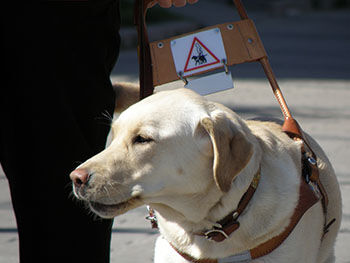University News Last updated 01 November 2022

Birmingham City University nursing students will train with furry four-legged friends this week, learning about the growing trend of using medical assistance dogs to help patient care.
The students will be taking part in a series of simulated scenarios, taking place at the University’s City South Campus in Edgbaston on Friday 4 November, to get a better understanding of how canine companions can support people with a range of clinical conditions.
The students, from the School of Nursing and Midwifery, will learn how to observe and interact with the assistance dogs during different healthcare events, including the treatment of a patient with a suspected seizure and the administering of a blood test to an anxious individual. The future healthcare professionals will also get an insight into how the dogs are trained to support people with various health conditions and to detect potentially dangerous situations.
Demonstrations will include an assistance dog supporting a person with disabilities, helping them with everyday tasks like getting dressed and going shopping. Another scenario, involving a patient with diabetes, will illustrate how their dog reacts to alert others when the person’s blood sugar levels drop too low.
The classes will take place at the home of the University’s healthcare courses, the Seacole Building, which earlier this year underwent a multi-million pound revamp. Among the facilities onsite is a simulated home environment, which will provide a realistic setting for the lessons.
Dr Stephen Wanless, Head of Department for Skills and Simulation from the University’s Faculty of Health and Life Sciences is coordinating the simulated teaching event. Stephen, who has autism and uses an assistance dog himself, said:
"Assistance dogs are widely thought of as being for people with visual impairments or hearing difficulties, but they can support patients with a wide range of health conditions. It’s vitally important therefore that our students gain a proper understanding of what assistance dogs can do for people with different care needs.
“We’re doing this by replicating real-life scenarios so that our students can learn what behaviours to adopt when dealing with assistance dogs and to identify situations where a patient would benefit from having one of these dogs.
Virtual reality and role play are becoming increasingly prevalent in healthcare education. The Nursing and Midwifery Council incorporates simulated learning hours into its training standards – and investment in simulated training technology formed a core part a £25million funding package for nursing training announced by the government last year.
Claire Maguire, Senior Lecturer in Skills and Simulation at Birmingham City University, added:
“Simulated learning is now playing a greater role in healthcare training, and as a result we have invested in our teaching spaces to create immersive, realistic environments for our students. We are trying to replicate real-life health events and it doesn’t get much more realistic than using fully trained medical assistance dogs in the classroom.
“We want to give our students an experience that closely matches what they’ll encounter when they go into ‘live’ environments like hospitals and other clinical spaces.”